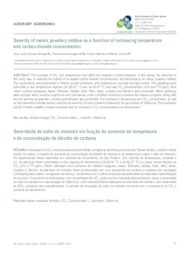Severity of melon powdery mildew as a function of increasing temperature and carbon dioxide concentration.
Severity of melon powdery mildew as a function of increasing temperature and carbon dioxide concentration.
Author(s): ARAUJO, A. L. S.; ANGELOTTI, F.; RIBEIRO JUNIOR, P. M.
Summary: The increase of CO2 and temperature may affect the progress of plant diseases. In this sense, the objective of this study was to evaluate the impact of increased carbon dioxide concentrations and temperature on melon powdery mildew. The experiments were performed in Fitotron growth chambers, with temperature, humidity and light control. The seedlings were submitted to two temperature regimes (20-26-33 ° C and 24-30-37 °C) and two CO2 concentrations (410 and 770 ppm). Nine melon cultivars (Araguaia, Awton, Eldorado, Gladial, Gold, Hibix, Natal, Juazeiro and Sancho) were evaluated. Melon seedlings were sprayed with a conidial suspension and maintained under controlled conditions to assess the disease progress. Along with the last severity assessment, conidia quantification was performed. The increase in temperature and CO2 concentration, as well as the interaction of these factors, reduces the severity of melon powdery mildew and the sporulation of Oidium sp. The incubation period of melon powdery mildew increases with an increase in CO2 concentrations and temperature.
Publication year: 2019
Types of publication: Journal article
Unit: Embrapa Semi-arid Region
Observation
Some of Embrapa's publications are published as ePub files. To read them, use or download one of the following free software options to your computer or mobile device. Android: Google Play Books; IOS: iBooks; Windows and Linux: Calibre.
Access other publications
Access the Agricultural Research Database (BDPA) to consult Embrapa's full library collection and records.
Visit Embrapa Bookstore to purchase books and other publications sold by Embrapa.

